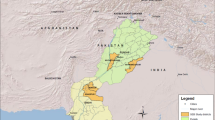Abstract
Rice farmers in rainfed areas face various constraints due to unfavorable environment caused by weather-related uncertainties. The weather-rice-nutrient integrated decision support system (WeRise), a seasonal climate prediction-based online application tool, was developed through the IRRI-Japan Collaborative Research Project (IJCRP) to improve the current situation of rainfed farmers. WeRise provides critical crop management advisory such as optimum sowing timing. The predictability of WeRise was evaluated through hind cast analysis and on-farm field validation in Indonesia. Results from hind cast analysis showed a high predictability of WeRise as demonstrated through a good model fit measured by normalized root mean square errors (RMSEn). Two groups of farmers using Ciherang variety in their cropping obtained different grain yields. The group who used WeRise advisories obtained significantly better grain yield than the group who did not. This also demonstrates another measure of the predictability of WeRise. In addition to technology development and validation, a technology transfer pathway was developed by IJCRP to identify stakeholders and their roles in the uptake and dissemination of WeRise. It involves stakeholders from the national and local governments. Capacity building of national government agencies who could be in-charge of localization/further development, operation, and maintenance of WeRise is among the components of the pathway. The integration of WeRise into the policy, research and development programs was also found to be crucial to facilitate technology transfer. Moreover, policy advocacy should be also conducted by IJCRP within the project implementation period for solving inherent problems including data sharing and coordination among the national and local agencies. Monitoring and evaluation (M&E) and post-technology transfer support are also key activities of IJCRP. While Southeast Asian countries may have different government structures, system, and information flow, the WeRise technology transfer pathway developed for Indonesia could serve as a guide for other countries and regions.
Access this chapter
Tax calculation will be finalised at checkout
Purchases are for personal use only
Similar content being viewed by others
References
BB PADI (2015) Deskripsi Varietas Unggul Baru Padi pp 77
Bouman BAM, Lampayan RM, Tuong TP (2007) Water management in irrigated rice: coping with water scarcity. International Rice Research Institute. p 54
Food and Agriculture Organization of the United Nations (FAO) (2018) Agricultural population. In: FAOSTAT. http://faostat.fao.org/site/291/default.aspx. Browsed on July 11, 2018
GRiSP (Global Rice Science Partnership) (2013) Rice Almanac, 4th edn. International Rice Research Institute, Los Banos
Haefele SM, Nelson A, Hijmans RJ (2014) Soil quality and constraints in global rice production. Geoderma 235–236:250–259
Hansen JW, Mishra A, Rao KPC, Indeje M, Ngugi RK (2009) Potential value of GCM-based seasonal rainfall forecasts for maize management in semi-arid Kenya. Agric Syst 101:80–90
Hayashi K, Llorca L (2016) The weather-rice-nutrient integrated decision support system (WeRise), JIRCAS working report 83
Hayashi K, Llorca L, Rustini S, Setyanto P, Zaini Z (2018) Reducing vulnerability of rainfed agriculture through seasonal climate predictions: a case study on the rainfed rice production in Southeast Asia. Agric Syst 162:66–76
Iizumi T, Nishimori M, Ishigooka Y, Yokozawa M (2010) Introduction to climate change scenario derived by statistical downscaling (in Japanese). J Agric Meteorol 66:131–143. https://doi.org/10.2480/agrmet.66.2.5
Jamieson PD, Porter JR, Wilson DR (1991) A test of the computer simulation model ARCWHEAT 1 on wheat crops grown in New Zealand. Field Crop Res 27:337–350
Mariano MJ, Villano R, Fleming E (2010) Are irrigated farming ecosystems more productive than rainfed farming systems in rice production in the Philippines? Agric Ecosys Envi 139(4):603–610
Peng S, Garcia FV, Laza RC, Sanico AL, Visperas RM, Cassman KG (1996) Increase N-use efficiency using a chlorophyll meter on high-yielding irrigated rice. Field Crops Res 47:243–252
Saediman H (2015) Improving agricultural research coordination at subnational level in Indonesia: an assessment of opportunities for strengthening Provincial Technology Commission. Int J Agric Ext 3(2):123–136
Schiller JM, Chanphengxay MB, Linquist B, Appa Rao S (eds) (2006) Rice in Laos. International Rice Research Institute, Los Baños
Tuong TP, Singh AK, Siopongco JDLC, Wade LJ (2000) Constraints to high yield of dry-seeded rice in the rainy season of a humid tropic environment. Plant Prod Sci 3(2):164–172
Wassmann R, Jagadish SVK, Heuer S, Ismail A, Redona E, Serraj R, Singh RK, Howell G, Pathak H, Sumfleth K (2009) Climate change affecting rice production: the physiological and agronomic basis for possible adaptation strategies. In: Donald L, Sparks DL (eds) Advances in agronomy, vol 101. Academic, Burlington, pp 59–122
Acknowledgment
WeRise was developed through the IRRI-Japan Collaborative Research Project (JCRP) funded by the Ministry of Agriculture, Forestry and Fisheries of Japan.
Author information
Authors and Affiliations
Corresponding author
Editor information
Editors and Affiliations
Rights and permissions
Copyright information
© 2019 Springer Nature Singapore Pte Ltd.
About this chapter
Cite this chapter
Hayashi, K., Llorca, L., Bugayong, I. (2019). Development, Validation, and Dissemination of a Decision Support System for Rainfed Rice Farming in Southeast Asia: A Case Study in Indonesia. In: Iizumi, T., Hirata, R., Matsuda, R. (eds) Adaptation to Climate Change in Agriculture. Springer, Singapore. https://doi.org/10.1007/978-981-13-9235-1_13
Download citation
DOI: https://doi.org/10.1007/978-981-13-9235-1_13
Published:
Publisher Name: Springer, Singapore
Print ISBN: 978-981-13-9234-4
Online ISBN: 978-981-13-9235-1
eBook Packages: Biomedical and Life SciencesBiomedical and Life Sciences (R0)




